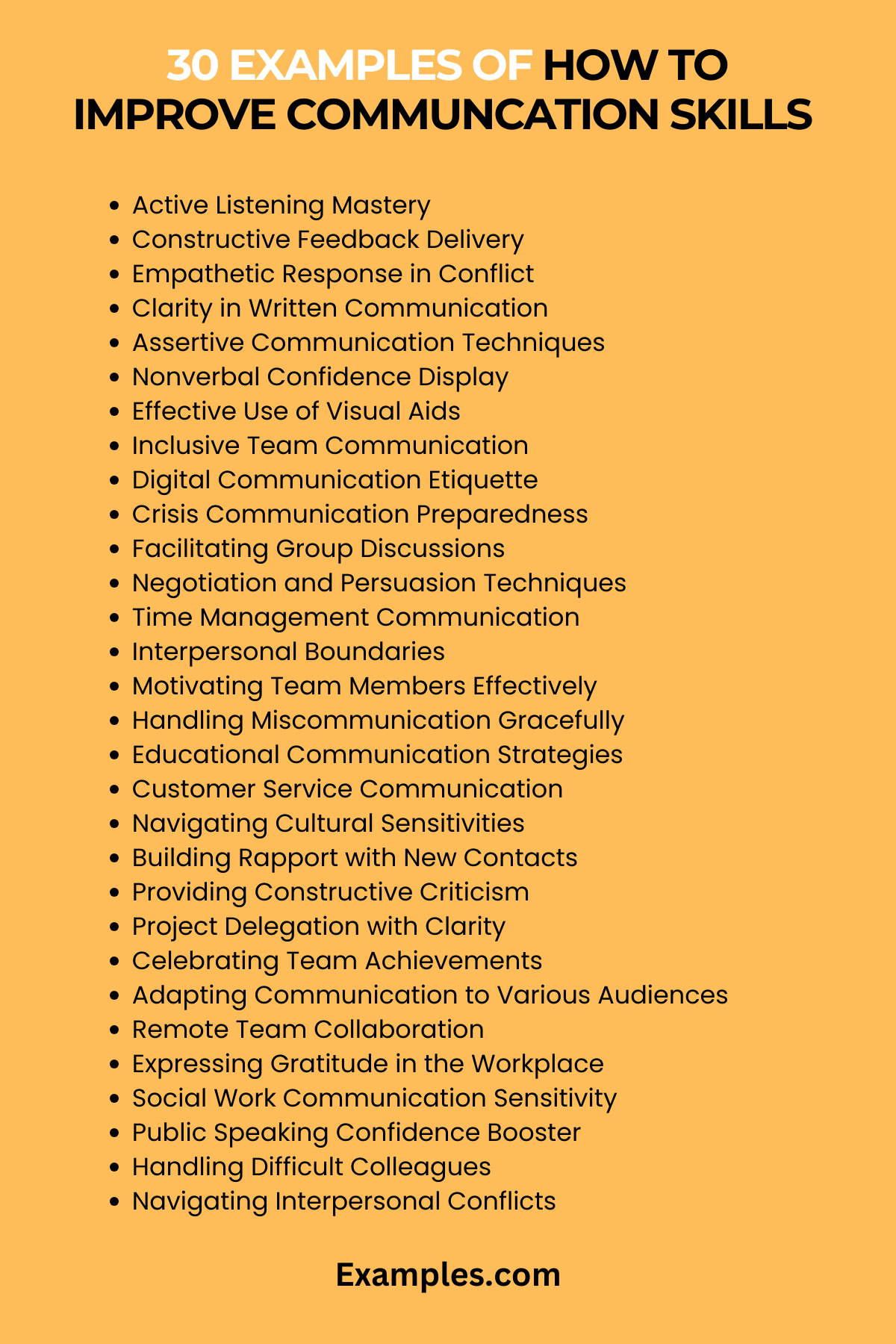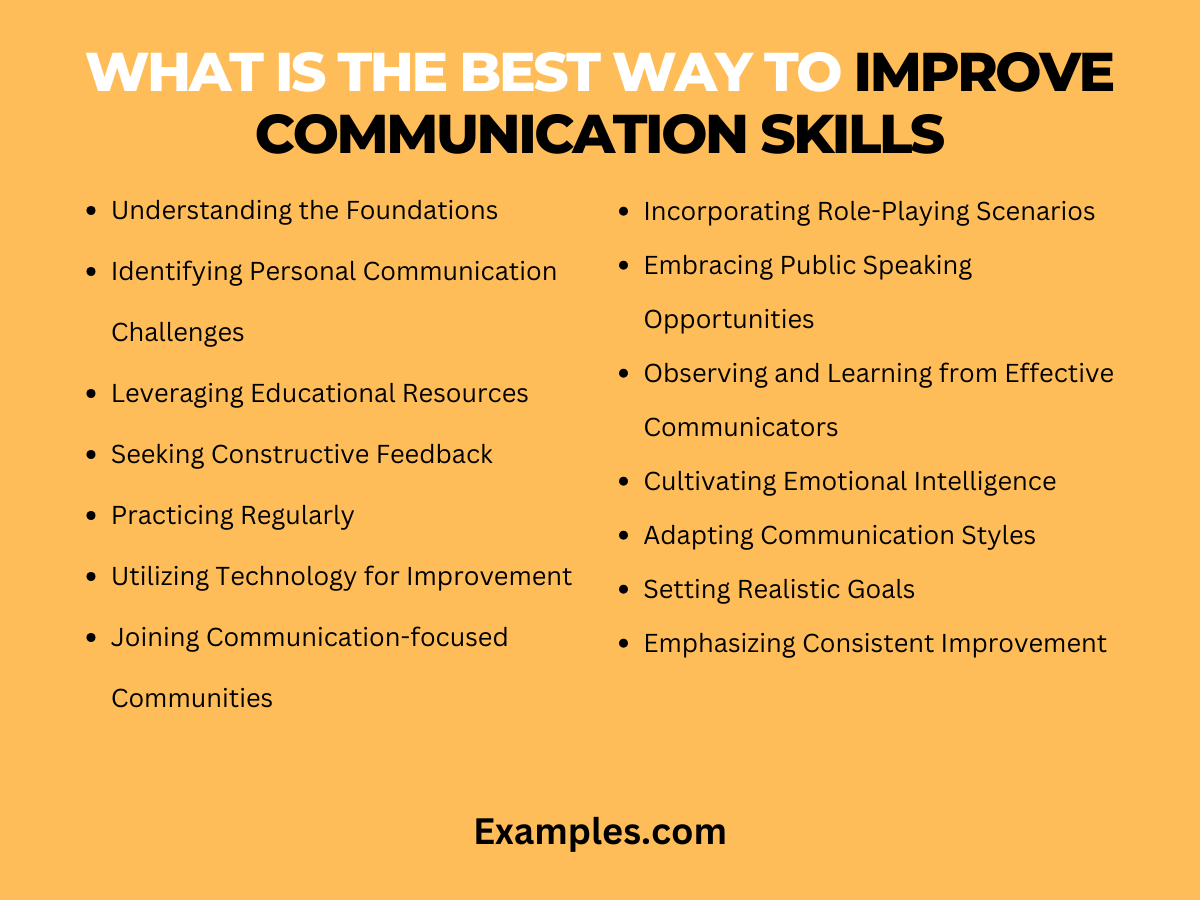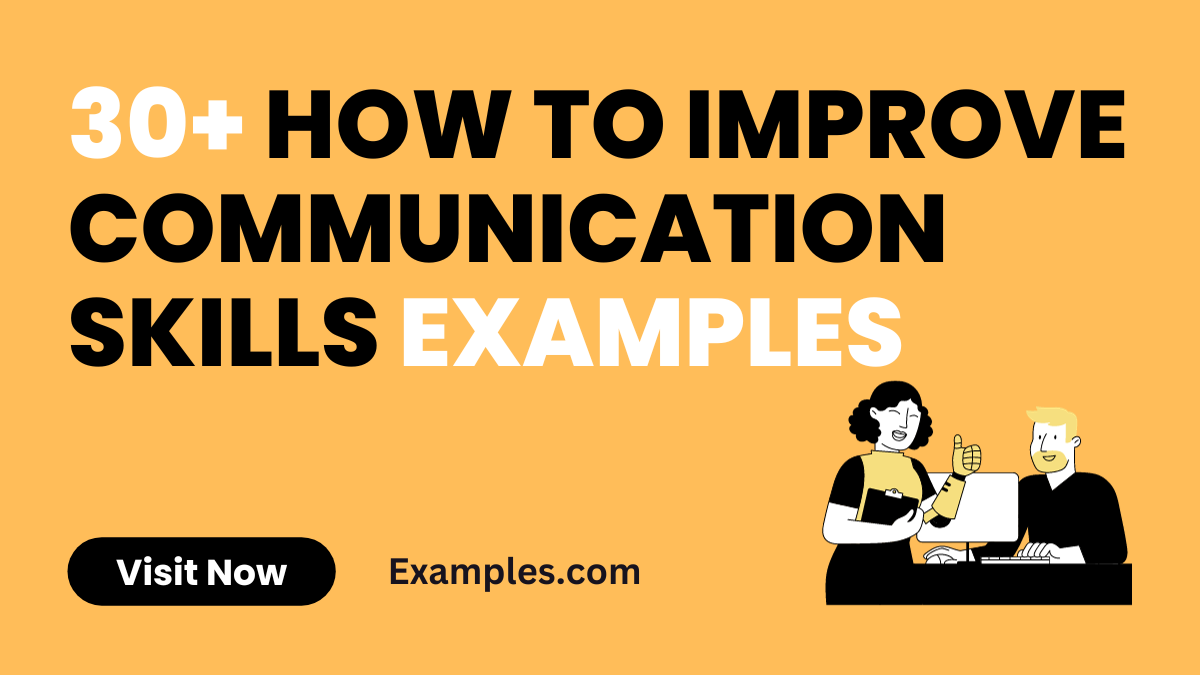29+ How to Improve Communication Skills Examples
Unlock the secrets of effective communication with our comprehensive guide on “How to Improve Communication Skills.” Navigate through 18 powerful strategies, expertly crafted to refine your expressive prowess. From nonverbal cues to assertive techniques, this guide is your gateway to enhanced connections. Immerse yourself in vivid Communication Examples, illustrating each strategy in real-life contexts. Elevate your interpersonal skills and embark on a journey of impactful communication in various facets of life.
30 Examples of How to Improve Communication Skills
Enhance your communication arsenal with 30 compelling examples, meticulously designed for practicality. Each example is accompanied by a brief explanation, offering insights into effective communication.

- Active Listening Mastery:
- Practice bold listening techniques by summarizing and reflecting on others’ statements for clearer understanding.
- Constructive Feedback Delivery:
- Offer bold feedback by framing observations positively and suggesting improvement strategies.
- Empathetic Response in Conflict:
- Display bold empathy by acknowledging emotions and expressing understanding during challenging discussions.
- Clarity in Written Communication:
- Achieve bold clarity in emails by structuring content logically and proofreading for precision.
- Assertive Communication Techniques:
- Master bold assertiveness by expressing opinions confidently while respecting others’ perspectives.
- Nonverbal Confidence Display:
- Exude bold confidence through body language, maintaining eye contact and adopting a composed posture.
- Effective Use of Visual Aids:
- Enhance understanding with bold visuals, using charts and diagrams to convey complex information.
- Inclusive Team Communication:
- Foster collaboration through bold inclusive language, ensuring everyone feels valued and heard.
- Digital Communication Etiquette:
- Navigate virtual conversations with bold etiquette, using appropriate tone and avoiding misinterpretations.
- Crisis Communication Preparedness:
- Stay calm and composed during crises, employing bold crisis communication strategies for clarity.
- Facilitating Group Discussions:
- Encourage active participation with bold discussion facilitation, asking open-ended questions and managing time effectively.
- Negotiation and Persuasion Techniques:
- Master bold negotiation by understanding others’ needs and presenting compelling arguments.
- Time Management Communication:
- Communicate expectations clearly, using bold time management language for efficient task allocation.
- Interpersonal Boundaries:
- Maintain bold boundaries by expressing limits respectfully and ensuring mutual understanding.
- Motivating Team Members Effectively:
- Inspire through bold motivation, recognizing achievements and fostering a positive team environment.
- Handling Miscommunication Gracefully:
- Resolve misunderstandings with bold grace, acknowledging errors and seeking clarifications.
- Educational Communication Strategies:
- Engage learners with bold educational strategies, incorporating interactive elements for enhanced understanding.
- Customer Service Communication:
- Handle customer concerns with bold service communication, expressing empathy and providing effective solutions.
- Navigating Cultural Sensitivities:
- Respect diverse perspectives with bold cultural awareness, adapting communication styles accordingly.
- Building Rapport with New Contacts:
- Forge connections using bold rapport-building, finding common ground and expressing genuine interest.
- Providing Constructive Criticism:
- Offer improvement insights with bold constructive criticism, focusing on specific actions and suggesting alternatives.
- Project Delegation with Clarity:
- Delegate tasks effectively with bold clarity, specifying expectations and providing necessary resources.
- Celebrating Team Achievements:
- Acknowledge successes with bold celebration, expressing appreciation and fostering a positive team culture.
- Adapting Communication to Various Audiences:
- Tailor messages to diverse audiences with bold adaptability, considering varying backgrounds and preferences.
- Remote Team Collaboration:
- Foster collaboration in virtual settings with bold remote communication, utilizing online tools for effective teamwork.
- Expressing Gratitude in the Workplace:
- Promote a positive atmosphere through bold gratitude, recognizing efforts and expressing appreciation.
- Social Work Communication Sensitivity:
- Navigate sensitive topics in social work with bold sensitivity, prioritizing empathy and active listening.
- Public Speaking Confidence Booster:
- Build confidence on stage with bold public speaking, practicing articulation and engaging presentation techniques.
- Handling Difficult Colleagues:
- Navigate challenging relationships with bold diplomacy, addressing concerns calmly and seeking resolution.
- Navigating Interpersonal Conflicts:
- Resolve conflicts amicably with bold conflict resolution, emphasizing mutual understanding and compromise.
18 Effective Strategies to Improve Your Communication Skills
Enhance your conversational finesse with 18 impactful strategies tailored for immediate application. Master nonverbal cues, refine written communication, and navigate diverse scenarios with confidence. Whether honing active listening or fostering cultural sensitivity, these strategies empower you to communicate effectively in any situation.

- Mirroring Technique:
- Reflect others’ gestures and expressions to establish rapport and enhance connection.
- Powerful Storytelling:
- Craft compelling narratives to convey messages with impact and captivate your audience.
- The Art of Silence:
- Employ strategic pauses to emphasize key points and allow for thoughtful responses.
- Adaptive Body Language:
- Adjust your posture and gestures to match the context and convey sincerity.
- Strategic Questioning:
- Pose thought-provoking questions to stimulate discussion and gain deeper insights.
- Feedback Loop Integration:
- Regularly seek and provide feedback to refine communication skills and foster growth.
- Emotional Intelligence Application:
- Harness emotional awareness to navigate interpersonal dynamics with sensitivity.
- Mindful Listening Practices:
- Cultivate mindfulness to fully engage in conversations and comprehend nuances.
- Cultural Communication Sensitivity:
- Adapt communication styles to respect and connect with individuals from diverse backgrounds.
- Agile Adaptability:
- Adjust communication strategies based on evolving circumstances and audience needs.
- Conflict Resolution Framework:
- Navigate conflicts constructively by addressing issues directly and seeking mutual understanding.
- Purposeful Nonverbal Cues:
- Use intentional body language and facial expressions to reinforce verbal messages.
- Precision in Written Communication:
- Master concise and clear written expression for effective and impactful messaging.
- Reflective Communication Analysis:
- Periodically assess your communication style, identifying areas for improvement and refinement.
- Humour and Levity Integration:
- Inject appropriate humour into conversations to create a positive and engaging atmosphere.
- Adapting to Various Communication Channels:
- Tailor your approach to suit different platforms, from in-person meetings to virtual interactions.
- Empathetic Connection Building:
- Forge deep connections by understanding and validating others’ emotions and perspectives.
- Respectful Interruption Management:
- Handle interruptions diplomatically, maintaining focus and ensuring all voices are heard.
What is The Best Way to Improve Communication Skills
Effective communication is a skill that can be honed and perfected with deliberate practice. Discover the optimal path to enhance your communication prowess with this detailed guide.

Understanding the Foundations
Establish a strong foundation by recognizing the key components of communication, including verbal and nonverbal cues, active listening, and empathy.
Identifying Personal Communication Challenges
Conduct a self-assessment to pinpoint specific areas of improvement, such as articulation, clarity, or assertiveness.
Leveraging Educational Resources
Explore a variety of educational materials, from books and online courses to workshops, tailored to address your unique communication needs.
Seeking Constructive Feedback
Engage with peers, mentors, or communication professionals to receive constructive feedback, gaining valuable insights into your strengths and areas for improvement.
Practicing Regularly
Implement a consistent practice routine, incorporating daily exercises that focus on different aspects of communication, such as tone modulation or body language.
Utilizing Technology for Improvement
Explore communication apps and tools designed to provide feedback, analyze speech patterns, and offer personalized recommendations for improvement.
Joining Communication-focused Communities
Connect with like-minded individuals in forums, clubs, or online communities to share experiences, tips, and resources for effective communication enhancement.
Incorporating Role-Playing Scenarios
Engage in role-playing exercises to simulate real-life communication scenarios, allowing you to practice and refine your skills in a controlled environment.
Embracing Public Speaking Opportunities
Take advantage of public speaking opportunities, whether in professional settings or community events, to boost your confidence and refine your articulation.
Observing and Learning from Effective Communicators
Study successful communicators, both in your personal and professional spheres, and observe their techniques, incorporating valuable strategies into your own repertoire.
Cultivating Emotional Intelligence
Develop emotional intelligence to better understand and manage emotions, fostering more meaningful connections in your interactions.
Adapting Communication Styles
Recognize the diversity of communication styles and adapt your approach to suit different audiences, ensuring your message resonates effectively.
Setting Realistic Goals
Establish achievable communication goals, breaking down the improvement process into manageable steps for steady progress.
Emphasizing Consistent Improvement
View communication skills enhancement as an ongoing journey, consistently seeking opportunities for growth and refinement.
As we conclude our journey through the guide “How to Improve Communication Skills,” it’s important to recognize that communication is an evolving skill, one that requires continual refinement and practice. By embracing the strategies laid out in this guide, from mastering nonverbal cues to developing assertive communication techniques, you are equipping yourself with tools essential for creating stronger, more meaningful connections in all areas of your life.
To further enhance your communication journey, consider exploring additional resources.
Websites like Harvard Business Review offer insightful articles and case studies on effective communication in professional settings, providing practical tips and real-world examples. Additionally, for those interested in academic perspectives or research-based insights, websites like Psychology Today delve into the psychological aspects of communication, offering a deeper understanding of interpersonal dynamics. By integrating these resources into your learning process, you can continue to grow and excel in your communication skills, making every interaction more impactful and rewarding??.



